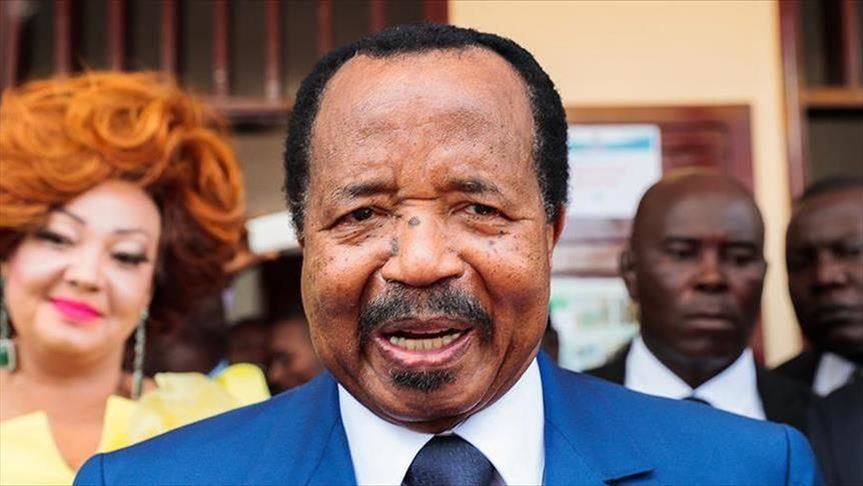
ANKARA / KIGALI
Cameroon President Paul Biya’s decision to order the release of separatists and opposition leader earlier this month is an important gesture of appeasement, experts say.
Maurice Kamto, Cameroon’s main opposition leader, regained his freedom on Oct. 5 after a military court in the country’s capital Yaounde, ordered his release at the request of Biya.
Kamto was arrested in January with some of his supporters following two-day long anti-government protests against presidential election results. He had claimed victory in last year’s presidential election after official results gave him 14% of the vote against Biya’s 71%.
On Oct. 3, Biya had ordered release of 333 separatist fighters, arrested for misdemeanors.
“Freeing separatists aim to appease the international community that has been criticizing President Paul Biya,” Christopher Kayumba, a political commentator and lecturer at the University of Rwanda’s School of Journalism and Communication, told Anadolu Agency.
“But it’s also partly aimed at politically appeasing the English community in the country,” he added.
The EU welcomed Biya’s order to release main opposition party leader amid national dialogue.
“President Biya’s decision to stop military court proceedings against several leaders and activists of political parties and movements, including the ‘Mouvement pour la renaissance du Cameroun’ [the Cameroon Renaissance Movement] and its president, Maurice Kamto, represents an important gesture of appeasement,” the EU said in a statement last week.
National Dialogue
Last month, President Biya called for a national dialogue that focused on the grievances of the English-speaking populations of the North West and South West regions of the Central African country.
The English regions has been marred by protests since 2016, with residents in English-speaking regions saying they have been marginalized for decades by the central government and the French-speaking majority. The protesters are calling for a return to federalism or independence of English-speaking Cameroon.
Talking about the national dialogue, Alexe Kitio Kenfack, a Cameroon diplomat and a Ph.D candidate at Gazi University in Turkish capital Ankara, said: ”It was a fundamental momentum as it succeeded to bring together all the national components, including political parties, civil society, citizens of the diaspora, religious and traditional dignitaries”.
”Beyond the mere need of calming down the national political atmosphere as perceived by people, in reality these different decisions are part of a transformation of the public space in Cameroon into a more competitive political framework,” he told Anadolu Agency.
Kenfack said he believes that the key outcome out of the dialogue ”is undoubtedly the granting of a special status to the two Anglophone regions”.
”So while trends of all kinds speculated on the form of the state, the granting of a special status to Cameroon’s English-speaking regions is of great opportunity that the parties should be able to read beyond words,” he added.
“The endowment of the North West and South West Regions with a Special status in conformity with Section 62 Sub 2 of the Constitution which states that the law may take into consideration the specificities of certain Regions with regards to their organization and functioning,” according to the final communique of the national dialogue held on Sept. 30-Oct. 4 under the chairmanship of Prime Minister Joseph Dion Ngute.
Reports indicate that several people including civilians, police and military officers have lost their lives in the protests. It has also displaced over 500,000 people.
“The only way this conflict can be resolved is through social justice policies and dealing with structural injustice like impoverishing the English speaking regions, political exclusion, etc,” said Kayumba.
“Separation won’t help Cameroon. Political inclusion, social justice and equality for all will,” he added.
Good gesture
Freddie David Egesa, a security analyst based in Uganda’s capital Kampala, thinks the release of the separatists should be seen in the context of shifting of alliances.
Alliances could form because of “pressure here and there” or because of “weaknesses here and there,” that the organizations might decide to cross borders and join other organizations or join the government, he said.
“In the process, the government also wanted to show a good gesture by releasing those they hold dear, maybe to concretize alliances which are upcoming,” Egesa told Anadolu Agency.
Egesa said he doesn’t see a policy shift in freeing the separatists.
On how best the conflict could be addressed, Egesa said he believed there is still need to find out the core needs of the people, their core sponsors, what they want and how best to address their issues.
“If their issues cannot be addressed then government should create a better force to crash them,” he said.
“You know there are demands which government may never even bother to look at such as demands of dividing a country into two. There are demands that can never be met with any other program other than fighting and crashing”.
French Cameroon gained its independence from France in 1960. In 1961, a federal state was set up when British Cameroon gained its independence from Great Britain and joined French Cameroon.
The federal state was, however, dissolved in favor of a unitary state in 1972. Since then, Anglophones say they are being marginalized and forced to use French in public institutions and schools, and also use the French-Cameroon legal system in courts.
“Ensure that educational reforms integrate the need to keep the two educational systems afloat buoyant and futuristic, recognizing the unique strengths and specificities of each subsystem, building on the strengths of each one to train well rounded and excellent Cameroonian graduates who will excel wherever they go,” according to the final communique of the national dialogue.
Anadolu Agency website contains only a portion of the news stories offered to subscribers in the AA News Broadcasting System (HAS), and in summarized form. Please contact us for subscription options.





